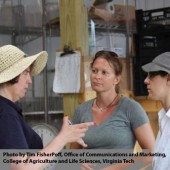
While sustainability is often perceived from a framework of fear, emergent understandings of sustainability are rooted in pedagogies of hope. In particular, radical hope, or critical-transformative hope, is transforming sustainability. Radical hope is contextually dependent and is made meaningful when in action. Collective movements such as the buen vivir social movements and transition movements are realizations of radical hope in praxis. Overall, this paper aims to demonstrate that through a multiplicity of movements, sustainability is in the process of continual becoming.
Continue Reading
There is evidence that the American agrifood system is a significant contributor to environmental, economic, social, and ethical-animal welfare damage to the earth and to society and is unsustainable, yet the worldview of a substantial percentage of the population conflicts with this assessment. A significant number of researchers, non-governmental organizations, and government entities assert that the detrimental effects of industrial agriculture must be addressed without delay and sustainable agricultural practices implemented. Attempting to change a worldview is not an easy task. A growing body of research in other disciplinary areas suggests that storytelling can serve as an effective method of fostering change. This mixed-methods study examines the role of storytelling in effecting positive change in worldview and attitudes toward sustainable agriculture. The study explores the effects of Story-based versus Information-based treatments on such change. The hypothesis of the study is that Story-based treatments will be more effective in promoting positive change than will Information-based treatments. The findings of the study provide evidence supporting this hypothesis. The story characteristics found to be associated with positive change included: first-hand personal view, vivid description, and identification with the story narrator.
Continue Reading